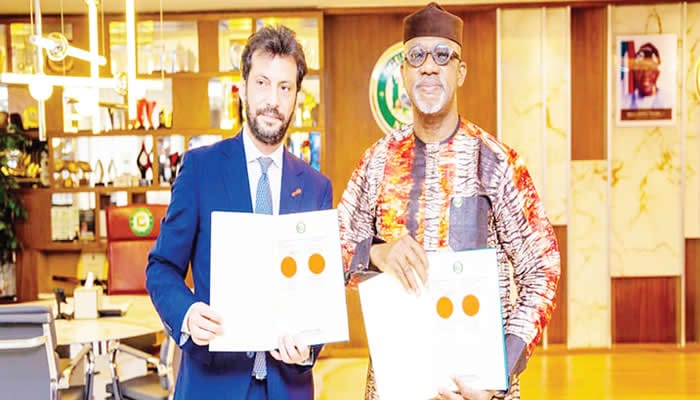Ogun, Morocco collaborate on energy, infrastructure, sign MoU

L-R: Executive Vice President, General Confederation of Employers in Morocco, Ali Zerouali and Ogun State Governor, Prince Dapo Abiodun, during the signing of a Memorandum of Understanding between the Ogun State Government and the Kingdom of Morocco in Abeokuta, Ogun State… on Wednesday. Photo: Ogun State Government/Punch Advertorial Services
Ogun, Morocco collaborate on energy, infrastructure, sign MoU.
The Ogun State government has signed a Memorandum of Understanding with the Confederation of General Employers of Morocco to collaborate on power generation and distribution, education, housing, infrastructure, and port development.
The signing ceremony held at the Governor’s Office, Oke-Mosan, Abeokuta on Wednesday saw Governor Dapo Abiodun sign on behalf of Ogun state and Mr Ali Zerouali for Morocco.
At the signing, Abiodun acknowledged Morocco’s prowess in the areas of education, technology, manufacturing, agriculture which Ogun State wants to key into.
He noted that the state was keen to learn from Morocco on how it perfected its hydro, solar, gas energy, with a view to bringing down the cost of energy in Nigeria.
“The success story of Morocco would be replicated in Nigeria with the arrival of the Confederation of General Employers of Morocco to establish operations in Ogun State.
“We hope that in our partnership we can unlock all the potential and maximize it. We want to learn from you how you perfected hydro, solar, and gas energy, which, of course, brings down the cost of energy.
“We identified agriculture, agribusiness, and agricultural technology, in which you are very advanced. Morocco today is the largest producer of fertilizer on the continent and one of the biggest exporters of fertilizer. I recall that you were informed of the plan to establish a massive fertilizer plant in Nigeria. We hope that we can bring that plant to Ogun State.
Abiodun added that the state wants to collaborate with Morocco to establish an automobile industry in Ogun State to supply automobiles abroad.
He added, “Being an industrial state, we discussed manufacturing and industrial development, in which you’ve excelled. How do we partner? How do we learn from you so we are not starting from scratch?
“How do we develop technology together? How do we collaborate with companies in Morocco to bring the automobile industry to Ogun State, where we know that from here, you can easily ship vehicles to all other countries in Sub-Saharan Africa?”
Noting that the state has a Special Economic Zone at the Gateway International Airport, which would serve as a Free Trade Zone, he sought partnership with Morocco on how to transfer technology to bring manufacturing and agricultural companies to the state.
Abiodun also identified issues with generating the needed energy to power its “Light Up Ogun Project.”
He said about 6,000 to 7,000 megawatts was needed to power the several industries operating in the state.
“We have issues with generation capacity; we have issues with efficient and effective distribution; we have issues with transmission, and we know that you have succeeded in that area in Morocco.
“We discussed how we can collaborate to ensure we generate enough electricity for the state under our Light Up Ogun Project,” he added.
He also said that his administration was ready to partner with Morocco in technical and vocational education.
This, he said, could be done by further strengthening the existing technical colleges to train Nigerian graduates.
On infrastructure, Abiodun said the state has obtained approval for the extension of the Blue Line from Lagos to Ogun State.
“Ogun State has a designated port area called Olokola, which is meant to be the deepest seaport in Nigeria. The desire to construct the port has been present for quite some time, and we would like to see this happening under our watch, even if it is a temporary berth port in the meantime,” he added.
Abiodun also informed his guests of his administration’s plan to build more houses for citizens and transform towns in the state into smart cities.
He added that despite the 5,000 houses built by his administration, there was still much to do, hence the need for partnership in the housing sector.
Speaking earlier, Mr. Zerouali, who is the vice president of CGEM, stated that his organization is ready to partner with the state in the automobile, agro-food industries, and the education sector, with the belief that it would help to strengthen economic ties between the two countries.
